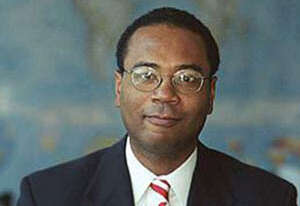
The case against OMB’s new race training memo
Speaking in favor of the latest iterations of racial sensitivity and inclusion training, the president of the Professional Managers Association Chad Hooper.
Best listening experience is on Chrome, Firefox or Safari. Subscribe to Federal Drive’s daily audio interviews on Apple Podcasts or PodcastOne.
We heard a voice in support of President Trump’s recent executive order banning the training of federal employees in Critical Race Theory and white privilege. Now we present one opposing the order. Speaking in favor of the latest iterations of racial sensitivity and inclusion training, the president of the Professional Managers Association Chad Hooper joined Federal Drive with Tom Temin. Click here if you want to hear the opposing view from right-leaning National Center for Public Policy Research Senior Fellow Horace Cooper.
Interview transcript:
Tom Temin: First of all, describe for us what you know about the training, the nature and the scope of the training with respect to diversity/inclusion that federal employees are generally exposed to.
Chad Hooper: Thank you Tom, for having me on. The question varies across agencies, we in PMA advocate for the employees in the Internal Revenue Service and those managers — and IRS, what a lot of people are experiencing, sort of a glancing overview of some sort of high level diversity ideals, the need to work together, the need to get along, but not really an in depth, I would say examination of our culture and processes. And those are typically optional to attend.
Tom Temin: Alright, and are you aware of anything that comes close to what is commonly known as critical racial theory being offered in IRS? Or have you heard about it from any other agencies?
Chad Hooper: Well, you know, in this moment, it’s top of mind, right. This sort of anti-racism, practice in leadership and people talk about decolonizing leadership is now at the cutting edge of leadership development and leadership training. I actually this week am participating in a leadership theory through the 22nd, with a number of leaders in that field of leadership practice. And I would say fully a third of the presentations are about how we as leaders in this new normal, and this new moment, need to be able to talk about dismantling the systemic racist structures that exists in our workplaces, in our society. So I think that it’s a place where the civil service in its desire to always have the management excellence and training excellence as is available in the private sector that we will need to be able to move into this.
Tom Temin: What are the systemic racial structures, because the last time I looked at the law, any sort of discrimination based on race, gender, color, creed, you name it, is illegal?
Chad Hooper: That’s exactly true, Tom. And unfortunately, the system is designed to allow a lot of that to slip through. I can share with you an example of from a woman who used to work for me, I’m actually a manager at the IRS, although I’m speaking to you now as the national president of the Manager Association. And in applying for jobs internally, where we use sort of a blind process, and we have all these protections and bureaucracy in our selection process, because she had a Hispanic last name, she found that it was difficult to qualify for promotions. And then during her career, she married somebody who had a very English sounding last name and the first job she applied for she was selected to, and she’s been selected for promotions ever since. Something as small as that, having a name like Martinez versus a name like mine, Hooper, is a form of demagogue racism.
Tom Temin: Well, then what can be done to if that’s the case, train people to not be that way?
Chad Hooper: Well, I think it begins with having the discussion that the training that OMB here is advocating against, or in many ways prohibiting, it’s first acknowledging that this exists. So many managers are unaware of just how pervasive this is in our system, how they’re not seeing on a macro level that you’re 50% less likely to get a promotion in the civil service if you’re a person of color, or if you’re a member of the military, you’re twice as likely to go to military court as a defendant when you’re an enlisted person of color. The irony of even having this discussion. GAO for decades has been reporting and throughout this entire year on all of the different axis of where racism and discrimination appear throughout every level of the civil service. And that has certainly been my experience as well, within IRS. We need to be able to have a direct and honest conversation about the state of play today so that tomorrow can be better.
Tom Temin: And what is the mechanism by which people assuming they’re exposed to this or have some sort of self regulatory situation where they learn about this in themselves to actually change? Because is the issue really what people’s attitudes are toward one another, or what they do in point of action? That is to say someone that is bigoted against this group, or that group could put that aside for purposes of getting the mission done and promoting people that are best qualified, that sounds idealistic, but is that possible?
Chad Hooper: I do. I hear that. I think that it’s hard for me to say, but it is true that there are going to be groups of people who have entrenched views, who are not going to move the needle. It’s my perspective as a leader of a Management Association that someone is entitled to have those views. But if they are unable to separate them from their decisions that they’re making at work, either consciously or unconsciously or with intention or willfulness. But then they need to have a path to respectfully transition out of leadership, because they’re going to have someone who works for them that is diverse on some axis. And we need to be able to account for that. The goal of the training, I think, for me is we’re talking about a societal change. So we would hope to see incremental improvement over time, and the government has a lot of opportunities to be better. But we are very good at tracking those sort of trends over long periods. So I think it’s something that the entire civil service can monitor, we can see where people of color are underrepresented, and queer people are underrepresented, and people of religious minorities are underrepresented in a way that does not reflect American society.
Tom Temin: And getting to the President’s executive order. We don’t really know for sure whether there is specific training happening in the federal government that tries to teach people that America is inherently evil or inherently racist. But if that were the case, would you say that that training should continue or should it be framed in some other way?
Chad Hooper: It’s my personal opinion on view, having taken these sorts of classes and led to these sorts of classes, it’s just simply a gross mischaracterization of the point of any racism training, although is a symptom sometimes for people where that conversation can be difficult. I have never heard of or attended an anti racism training that says that America is inherently evil. And I also cannot imagine anyone attempting to contract with the federal government to deliver such training to have that like in their pitch pack. Instead, we do have a history of racism in the nation. And it is true that we spent more years either in a period of slavery with like actual chattel slavery and a period of segregation. We didn’t have a Civil Rights Act until 1965, in my parents lifetime, this is very recent history. And the notion that we would not have to as a society heal from that or reconcile our past practice with our current situation to me is very cognitively dissonant, I just don’t believe that we can stick our head in the sand and say it will all work out.
Tom Temin: And just for the record, as a long term employee of the IRS and a manager there, just give us a sense of the nature of the training on diversity and inclusion that does happen at the IRS.
Chad Hooper: Sure. So I think it’s important to note that, you know, we’re not even sure that this memo is correcting an issue that exists. We at the IRS don’t tend to bring in outside educators for this sort of inclusivity training. At our agency, we have a robust equity, diversity and inclusion function subcomponent of the IRS even have their own overlapping diversity and inclusion program — which hosts on special emphasis topics in a way that the agency is creating the material we employ the educators as civil servants. I myself have created and hosted presentations for the equity program on the concepts of covering in the workplace and the pressure that that causes on people of different races. And so those sorts of offerings are effectively the training that’s available here, little webinars, lunch and learn in this ad hoc fashion where attendance is almost always voluntary.
Copyright © 2025 Federal News Network. All rights reserved. This website is not intended for users located within the European Economic Area.
Tom Temin is host of the Federal Drive and has been providing insight on federal technology and management issues for more than 30 years.
Follow @tteminWFED
Related Stories

Federal managers voice their opposition to White House cancellation of race training




